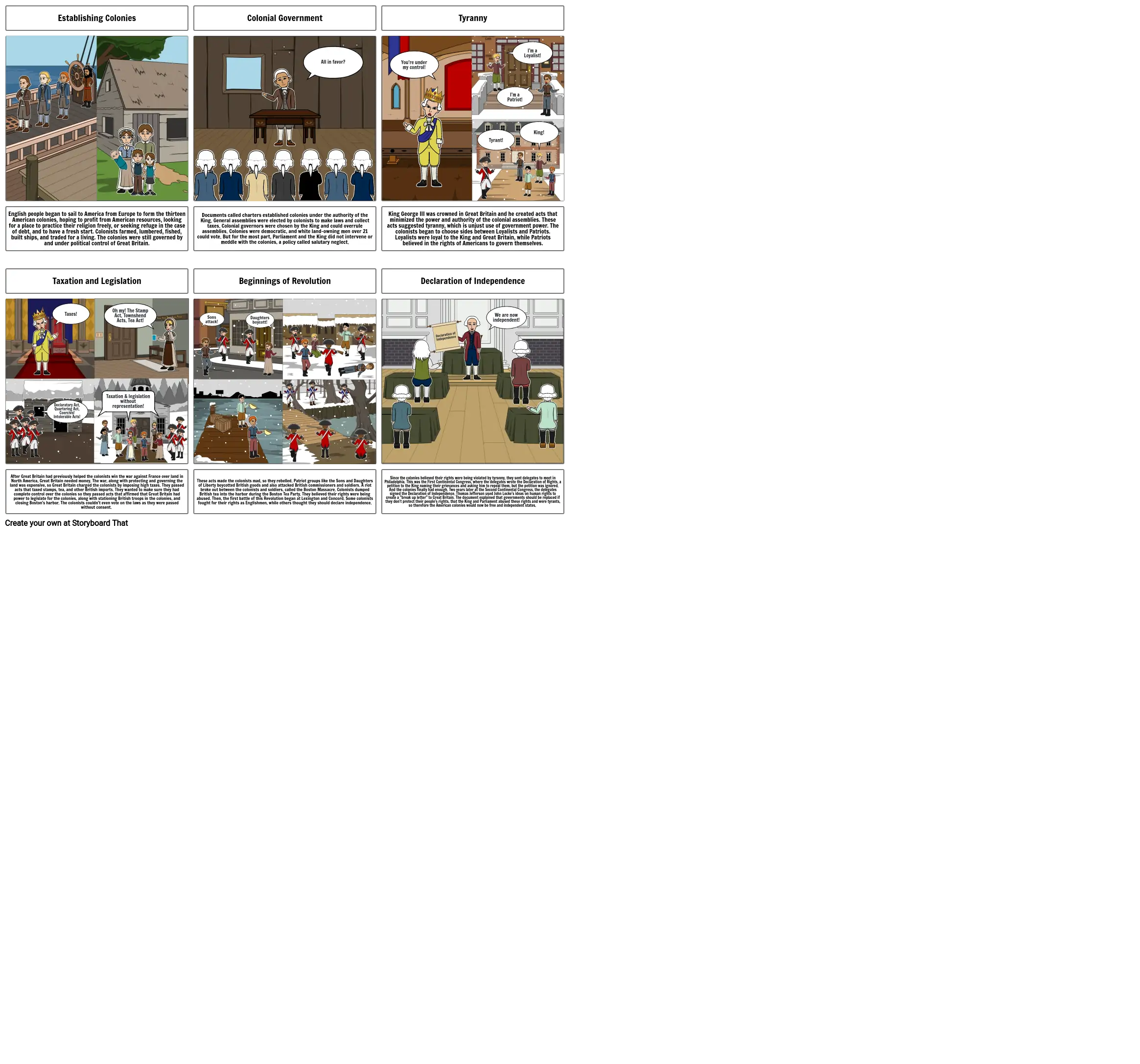L Shacklett Revolution Storyboard

Storyboard Text
- Establishing Colonies
- Colonial Government
- All in favor?
- Tyranny
- You're under my control!
- Tyrant!
- I'm a Patriot!
- I'm a Loyalist!
- King!
- English people began to sail to America from Europe to form the thirteen American colonies, hoping to profit from American resources, looking for a place to practice their religion freely, or seeking refuge in the case of debt, and to have a fresh start. Colonists farmed, lumbered, fished, built ships, and traded for a living. The colonies were still governed by and under political control of Great Britain.
- Taxation and Legislation
- Taxes!
- Oh my! The Stamp Act, Townshend Acts, Tea Act!
- stamp
- Documents called charters established colonies under the authority of the King. General assemblies were elected by colonists to make laws and collect taxes. Colonial governors were chosen by the King and could overrule assemblies. Colonies were democratic, and white land-owning men over 21 could vote. But for the most part, Parliament and the King did not intervene or meddle with the colonies, a policy called salutary neglect.
- Beginnings of Revolution
- Sons attack!
- Daughters boycott!
- King George III was crowned in Great Britain and he created acts that minimized the power and authority of the colonial assemblies. These acts suggested tyranny, which is unjust use of government power. The colonists began to choose sides between Loyalists and Patriots. Loyalists were loyal to the King and Great Britain, while Patriots believed in the rights of Americans to govern themselves.
- Declaration of Independence
- Declaration of Independence
- We are now independent!
- After Great Britain had previously helped the colonists win the war against France over land in North America, Great Britain needed money. The war, along with protecting and governing the land was expensive, so Great Britain charged the colonists by imposing high taxes. They passed acts that taxed stamps, tea, and other British imports. They wanted to make sure they had complete control over the colonies so they passed acts that affirmed that Great Britain had power to legislate for the colonies, along with stationing British troops in the colonies, and closing Boston's harbor. The colonists couldn't even vote on the laws as they were passed without consent.
- Declaratory Act, Quartering Act, Coercive/Intolerable Acts!
- Taxation & legislation without representation!
- These acts made the colonists mad, so they rebelled. Patriot groups like the Sons and Daughters of Liberty boycotted British goods and also attacked British commissioners and soldiers. A riot broke out between the colonists and soldiers, called the Boston Massacre. Colonists dumped British tea into the harbor during the Boston Tea Party. They believed their rights were being abused. Then, the first battle of this Revolution began at Lexington and Concord. Some colonists fought for their rights as Englishmen, while others thought they should declare independence.
- Since the colonies believed their rights were being violated by tyranny, they sent delegates to meet in Philadelphia. This was the First Continental Congress, where the delegates wrote the Declaration of Rights, a petition to the King naming their grievances and asking him to repeal them, but the petition was ignored. And the colonies finally had enough. Two years later at the Second Continental Congress, the delegates signed the Declaration of Independence. Thomas Jefferson used John Locke's ideas on human rights to create a "break up letter" to Great Britain. The document explained that governments should be replaced if they don't protect their people's rights, that the King and Parliament abused these rights and were tyrants, so therefore the American colonies would now be free and independent states.
Over 30 Million Storyboards Created

